#The significance of seeking knowledge in Islam
Explore tagged Tumblr posts
Text
The Importance of Knowledge in Islam: Worship and Worldly Success
Islam places immense value on the pursuit of knowledge, encouraging believers to exercise their intellect and reflect deeply on the world around them. This spiritual journey not only strengthens one’s bond with Allah (SWT) but also brings numerous benefits in both this life and the Hereafter. In this article, we explore the importance of seeking and teaching knowledge in Islam, supported by…
#Benefits of learning in Islam#digitalislamicguide#Hadith about the importance of knowledge#Hadith on Knowledge#Importance of Knowledge#Islam#Islamic Knowledge#Quran#Quran verses about knowledge and wisdom#Quranic Teachings#sahih muslim#Seeking Knowledge#Spiritual journey through Islamic teachings#The significance of seeking knowledge in Islam
0 notes
Photo
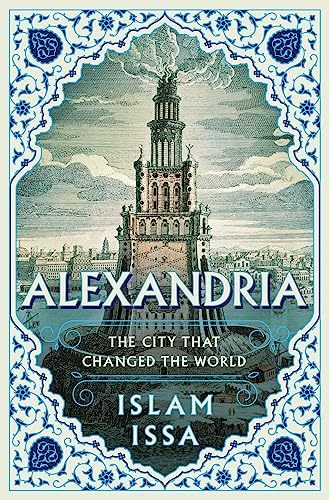
Alexandria: The City that Changed the World
"Alexandria: The City That Changed the World" by Islam Issa is a biography of a city. It explores the history of Alexandria, Egypt, and its place in our collective memory. It is in part history book, essay, and travel guide, suitable for casual readers. Issa covers up to the 1952 Egyptian Revolution through the lens of his family history. Along the way, he describes the physical city, from the waterfront Qaitbay Citadel where the Lighthouse of Alexandria once stood to the congested downtown.
The book begins with Alexandria's founding by Alexander the Great after he conquered the Persian Empire. Like its legendary namesake, the city was destined for fame. Its strategic and symbolic value made it a coveted prize of world conquerors like Augustus, Napoleon Bonaparte, and Admiral Nelson. The city witnessed the death of Cleopatra, Christianity's triumph over paganism, the rise of the Islamic Caliphates, and the Industrial Age. Even today, Alexandria is an important center of trade, culture, and industry.
The Ptolemaic dynasty, who ruled Egypt in the interim between Alexander and the Roman Empire, transformed it into their crown jewel. Through institutions like the Library of Alexandria, the city became a capital of knowledge and scholarly collaboration. The combined civilizational heritage of East and West birthed a unique urban culture and architectural marvels. This wealth and cosmopolitanism attracted the artistic and scholarly communities that shaped the city's image.
Issa is a professor of literature and history at Birmingham City University, and his family lived in Alexandria for generations. The result of his experience is a powerful monograph on the city’s cultural significance. It is firmly rooted in historical fact, and it is easy to pick up on Alexandria's personal importance to the author. In the prologue, he recalls his father's old stories about Alexandria's former glory, and how they took on new significance for him as he confronted the legacy of Alexandria as an adult. The memory of the ancient city lives on as part of Egypt’s national mythology, inspiring modern-day monuments and legends.
Rather than repeating myths, Issa seeks to critically examine them in light of factual evidence, allowing both the real and imaginary Alexandria to exist side-by-side. At the beginning of the book, there is a series of maps depicting the city at different points in time, from its foundation to the 21st century. It also contains a collection of photographs, some capturing the city today and others portraying its historical sites and artifacts. While intended for casual readers, the book has endnotes and a bibliography to point readers in the direction of further study.
The author concludes the book with an examination of Alexandria's identity and Egyptian national identity in the present day. In contemporary Egypt, there is broad support for historical preservation, but politics determine which histories are deemed worthy of preservation and which are censored. Environmental changes and the rapid construction of an ever-growing modern metropolis on top of the ancient city threaten archaeological efforts. As has been true since the city’s foundation, what is believed about Alexandria’s past – and what it means to be Alexandrian – is constantly changing.
Continue reading...
97 notes
·
View notes
Text
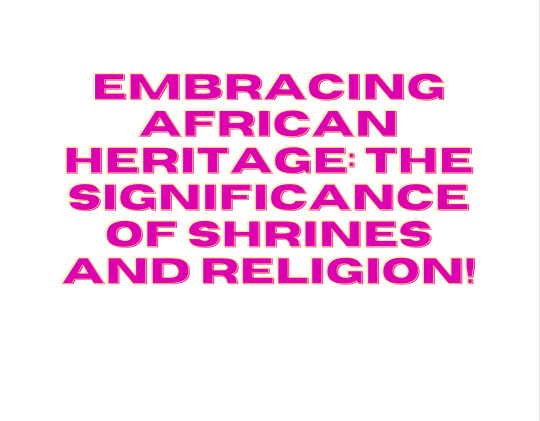
Embracing African Heritage: The Significance of Shrines and Religion

Africa, often referred to as the cradle of humanity, boasts a rich tapestry of cultures, traditions, and spiritual beliefs that have endured for millennia. Central to this heritage are the sacred shrines and profound religious practices that serve as pillars of community, identity, and connection to the divine.
Shrines, both natural and constructed, hold a special place in African spirituality. These sites are often nestled in the heart of communities or hidden within the vast landscapes of the continent. From the iconic pyramids of Egypt to the humble groves of the Yoruba in Nigeria, each shrine reflects a unique blend of history, mythology, and reverence for the ancestors.
One of the fundamental aspects of African religion is the veneration of ancestors. Ancestral shrines serve as focal points for prayers, offerings, and rituals aimed at honoring those who came before. These ancestors are believed to possess wisdom, guidance, and protection, and their spirits are invoked for blessings and assistance in times of need. In many African societies, the bond between the living and the dead is deeply cherished, with rituals and ceremonies reinforcing the interconnectedness of past, present, and future generations.
Moreover, African shrines are often associated with specific deities or spirits, each embodying different aspects of the natural world or human experience. Whether it's Oshun, the Yoruba goddess of love and fertility, or Anubis, the ancient Egyptian god of the afterlife, these divine entities are revered through elaborate ceremonies, dances, and sacrifices. Through these rituals, devotees seek communion with the divine and seek guidance in matters of health, prosperity, and spiritual growth.
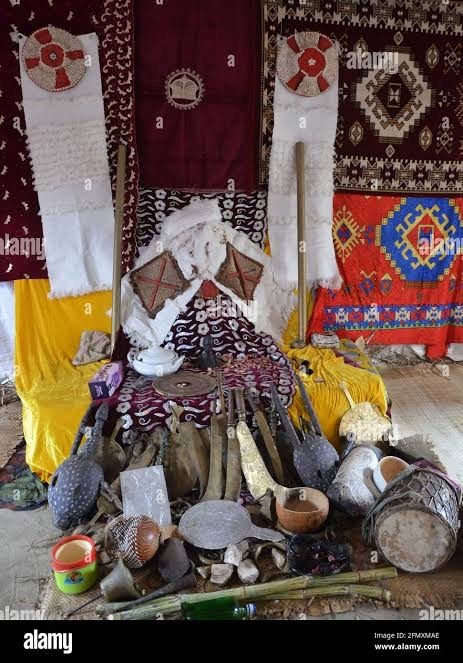
However, the significance of African shrines extends beyond the realm of spirituality. They are also repositories of cultural knowledge, oral traditions, and historical narratives passed down through generations. Within the sacred precincts of these sites, elders impart wisdom, storytellers weave tales of heroism and creation, and artists imbue their craft with symbols and motifs that speak to the essence of African identity.
Unfortunately, the colonial era and the spread of Christianity and Islam have often marginalized indigenous African religions, dismissing them as primitive or pagan. Despite this, many communities continue to uphold their traditional beliefs, adapting them to the challenges of modernity while preserving their core values and rituals. In recent years, there has been a renewed interest in African spirituality, fueled by a desire to reclaim cultural heritage and reconnect with ancestral roots.

In conclusion, African shrines and religion embody the resilience, diversity, and spirituality of the continent's people. They are more than just places of worship; they are living testaments to the enduring legacy of Africa's past and the enduring power of its traditions. As we navigate an increasingly interconnected world, embracing and honoring Africa's rich heritage is not only a matter of cultural preservation but also a celebration of the human spirit's boundless capacity for faith, creativity, and reverence for the divine.

#life#animals#culture#aesthetic#black history#history#blm blacklivesmatter#anime and manga#architecture#black community
63 notes
·
View notes
Text
Embracing the Beauty of Islam: It’s Profound Effects
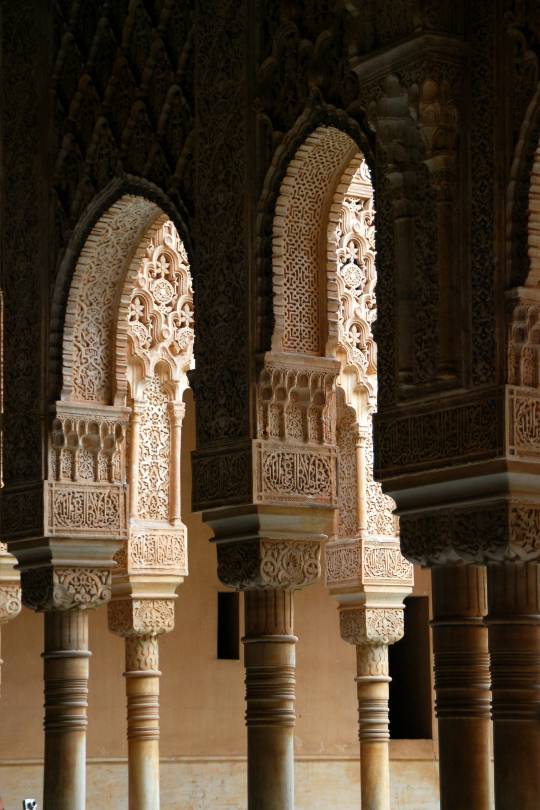
Islam, with its plethora of teachings, is a source of profound beauty that enriches the lives of its followers and extends a universal invitation to all. This article explores some of the positive effects of Islam, shedding light on how these principles enhance our lives and contribute to the well-being of society.
Compassion and Charity: A Heartfelt Connection
Islam places a significant emphasis on compassion and charity, encouraging believers to extend a helping hand to those in need. The Prophet Muhammad (peace be upon him) said, “The believer’s shade on the Day of Resurrection will be his charity” (Sahih Al-Bukhari). Acts of kindness and charity not only alleviate the suffering of others but also purify the soul of the giver.
Social Justice: Upholding Justice and Fairness
In the Quran, Allah emphasises justice, declaring, “O you who have believed, be persistently standing firm for Allah, witnesses in justice, and do not let the hatred of a people prevent you from being just” (Quran 5:8). Islam advocates for fairness and equality, rejecting discrimination based on race, ethnicity, or socioeconomic status. This commitment to social justice fosters harmony and unity in diverse communities.
O believers! Stand firm for Allah and bear true testimony. Do not let the hatred of a people lead you to injustice. Be just! That is closer to righteousness. And be mindful of Allah. Surely Allah is All-Aware of what you do. [Quran 5:8]
Family Values: The Foundation of a Strong Society
Islam places great importance on family values, considering the family unit as the cornerstone of a healthy society. The Prophet Muhammad (peace be upon him) said, “The best of you is the one who is best to his family” (Sunan Ibn Majah). Islam encourages love, respect, and support within the family, fostering an environment where individuals can thrive and contribute positively to society.
Personal Development: Nurturing Mind, Body, and Soul
Islam offers a holistic approach to personal development, emphasising the well-being of the mind, body, and soul. The Quran instructs believers to seek knowledge continuously, and the Prophet Muhammad (peace be upon him) highlighted the importance of physical health. This holistic approach promotes balance and harmony in individual lives, creating a foundation for a prosperous society.
Environmental Stewardship: Guardians of the Earth
Islam teaches believers to be stewards of the Earth, reminding them of their responsibility to protect and preserve the environment. This environmental consciousness encourages sustainable practices and a sense of responsibility towards the planet.
The Prophet Muhammad (peace be upon him) said, “The world is sweet and verdant, and verily Allah is going to install you as vicegerent in it to see how you act” (Sahih Muslim)
As Muslims, embracing these teachings enhances our lives, and as a universal message, it invites people of all backgrounds to appreciate the beauty inherent in Islam. By embodying these principles, we contribute to a world where family, justice, and community prevail.
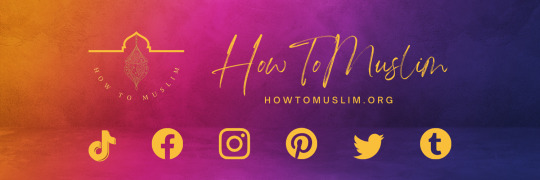
#islam#islamicreminders#muslim#islamdaily#islamic#allah#quran#islamiyet#mosque#new article#newblog#writing community#social justice
42 notes
·
View notes
Text
Can Dua Change Fate? Lessons from Hadith and Quran
In the intricate tapestry of Islamic faith, dua (supplication) holds a significant place. It is a personal plea to Allah, reflecting a believer’s reliance and trust in divine intervention. A question that often arises among Muslims is whether dua can change fate. To explore this, we delve into the lessons from the Hadith and the Quran.
Understanding Fate in Islam
Fate, or Qadr, in Islam, refers to the divine decree. It is the belief that Allah has preordained every event and outcome. However, Islam also teaches that humans have free will, and their actions, prayers, and supplications can influence their destiny within the framework of divine wisdom.
Dua and Its Significance
Dua is a powerful form of worship in Islam. It is not merely a request but an expression of a believer’s dependence on Allah. The Quran and Hadith emphasize the importance and effectiveness of dua. Allah encourages believers to call upon Him, promising that He will respond.
Quranic Perspective on Dua and Fate
The Quran highlights several instances where dua has played a crucial role in changing circumstances. For instance:
1. Prophet Yunus (Jonah): After being swallowed by a whale, Prophet Yunus made a heartfelt dua, acknowledging his mistakes and seeking Allah’s mercy. Allah accepted his supplication and saved him from the depths of the ocean (Quran 21:87-88).
2. Prophet Zakariya (Zechariah): Despite his old age and his wife’s barrenness, Prophet Zakariya prayed for a child. Allah answered his prayer, granting him a son, Yahya (John) (Quran 19:2-10).
These examples illustrate that dua can indeed alter circumstances, demonstrating Allah’s responsiveness to sincere supplications.
Hadith on Dua and Fate
Several Hadith further elucidate the relationship between dua and fate:
1. The Power of Dua: The Prophet Muhammad (peace be upon him) said, “Nothing can change the Divine decree except dua” (Sunan Ibn Majah). This Hadith indicates that while fate is preordained, dua has the potential to alter its course.
2. Dua as a Shield: Another Hadith states, “Dua benefits in things that have happened and things that have not happened yet. So make dua, O servants of Allah” (Jami` at-Tirmidhi). This suggests that dua serves as a protective measure, influencing both present and future events.
Balancing Fate and Free Will
The interplay between fate and free will is a profound aspect of Islamic theology. While Allah’s knowledge encompasses all events, human beings are granted the agency to make choices and seek divine intervention through dua. This balance is beautifully encapsulated in the Quranic verse: “Indeed, Allah will not change the condition of a people until they change what is in themselves” (Quran 13:11). This verse underscores the importance of human effort and supplication in shaping one’s destiny.
Conclusion
Dua is a testament to a believer’s faith and trust in Allah’s mercy and power. While fate is a divine decree, the teachings from the Quran and Hadith affirm that sincere supplications can influence and change one’s destiny. Through dua, believers are invited to actively engage with their Creator, seeking His help and intervention in every aspect of their lives. Thus, dua is not only a means of communication with Allah but also a profound tool for navigating the complexities of fate and free will.
16 notes
·
View notes
Text
Trope chats: immortality

The concept of immortality has fascinated humankind for millennia, often appearing in myths, folklore, religious texts, and modern literature. It evokes existential questions about the nature of life, death, and time, while exploring what it means to be human. As a literary device, immortality serves as a lens through which authors explore morality, purpose, and human frailty. However, it also comes with narrative risks, including the potential for repetitiveness or a lack of emotional stakes. Beyond literature, the immortality trope also plays a significant role in shaping societal beliefs, fears, and aspirations. This essay delves into the uses, pitfalls, and broader societal impact of the immortality trope, highlighting its continued relevance and complexity in storytelling.
The origins of the immortality trope can be traced back to ancient myths and religious stories. In the Epic of Gilgamesh, one of the oldest recorded works of literature, the hero seeks immortality after confronting the inevitability of death following the loss of his friend, Enkidu. His journey highlights the futility of escaping death, yet simultaneously reflects the enduring human desire to transcend it.
Similarly, in Greek mythology, figures like Tithonus and the gods themselves embody different aspects of immortality. Tithonus, granted immortality without eternal youth, serves as a cautionary tale about the consequences of living forever but decaying in body. The gods’ immortality, on the other hand, emphasizes their divine nature and separateness from the human condition. Immortality in these tales often reflects not just a desire for eternal life but a deeper exploration of what it means to live and die well, and how immortality complicates those values.
In many religious traditions, immortality is also connected to the afterlife. Christianity, Islam, and Buddhism each promise a form of life beyond death, whether it is eternal paradise, reincarnation, or enlightenment. The religious portrayal of immortality often carries moral undertones, where eternal life is a reward for virtuous living. Here, immortality is not inherently desirable but conditional, serving as both an incentive for moral behavior and a reflection of divine justice.
As literature evolved, the immortality trope took on new dimensions. In modern fiction, immortality is often examined through the lens of individual psychology, ethics, and social dynamics. The vampire genre, popularized by Bram Stoker's Dracula and modernized by works like Anne Rice's The Vampire Chronicles, explores the existential burden of living forever. Vampires, often cursed with immortality, grapple with isolation, moral decay, and ennui. In these stories, immortality becomes a prison rather than a gift, highlighting the human need for connection, change, and mortality.
More recently, works like Kazuo Ishiguro’s Never Let Me Go and The Age of Adaline reframe the immortality theme within the context of scientific advancement and human experimentation. These narratives question the ethical boundaries of life extension and the implications of such technological progress. For instance, in Never Let Me Go, the cloned characters are treated as vessels for immortality by others, emphasizing the dehumanizing consequences of pursuing eternal life through unethical means.
In speculative fiction, Ray Bradbury’s The Martian Chronicles and Isaac Asimov’s Foundation series engage with the idea of immortal civilizations or entities. These works extend the immortality theme beyond individuals, questioning whether societies and cultures themselves can achieve a kind of immortality through knowledge, science, or colonization of new worlds.
The immortality trope allows for the exploration of a wide array of philosophical and emotional themes, making it a powerful tool for authors. Key among these are the notions of time, identity, and morality.
Immortal characters often experience time in profoundly different ways than mortal beings, leading to a disconnection from human concerns. In works like Tolkien’s The Lord of the Rings, the Elves, who are immortal, possess a deep historical memory and an inherent melancholy, as they witness the rise and fall of kingdoms and people. Their immortality gives them a different perspective on war, love, and life itself, where events that seem monumental to mortals are but fleeting moments in their endless existence.
Immortality raises questions about personal identity over time. How does an individual maintain their sense of self over centuries or millennia? In works like Virginia Woolf’s Orlando, the protagonist’s immortality and gender fluidity are intertwined, allowing Woolf to explore the fluidity of identity over time and space. In contrast, works like The Picture of Dorian Gray by Oscar Wilde show the dangers of eternal youth, where a refusal to change or grow leads to moral and psychological decay.
Immortality often complicates ethical decision-making. Characters who cannot die may become indifferent to the suffering of others, seeing human life as transient and insignificant. This is evident in characters like Doctor Manhattan from Alan Moore’s Watchmen, whose near-omniscience and immortality alienate him from humanity, as he struggles to find meaning in life and morality. Alternatively, immortal characters might strive to use their endless time for benevolent purposes, as seen with Captain Jack Harkness in Doctor Who, who serves as a protector despite the pain his immortality causes him.
Despite its narrative potential, the immortality trope has several pitfalls. One of the major risks is that of repetitiveness. Immortal characters, particularly those in long-running series, may struggle to evolve in meaningful ways, since their inability to die removes traditional narrative stakes. This can lead to stagnant character arcs, where the potential for growth and change is limited by the character’s inherent invulnerability.
Another challenge is diminished emotional engagement. Mortality is central to the human condition, and much of a reader’s emotional investment comes from the awareness that a character's time is limited. In stories featuring immortality, the absence of death as a real possibility can lessen tension. Authors must compensate for this by introducing alternative stakes, such as the potential for emotional or existential suffering, as seen in Interview with the Vampire, where the emotional isolation of eternal life becomes the central conflict.
Lastly, immortality can sometimes lead to philosophical overload, where stories become bogged down by metaphysical debates and lose touch with the characters themselves. When immortality is used merely as a plot device for abstract musings on existence, it risks alienating readers who are more invested in narrative progression or character development.
The immortality trope also resonates beyond literature, reflecting broader societal anxieties and desires. In an age where scientific advancements, such as stem cell research, anti-aging technology, and the quest for digital consciousness, promise the possibility of extending human life, the trope takes on new relevance. It serves as a platform to explore the ethical, philosophical, and emotional consequences of such pursuits.
The immortality trope taps into the human fear of death and the desire to leave a lasting legacy. Whether through biological immortality or cultural immortality (such as leaving behind great works of art or knowledge), many people seek ways to outlive their finite lifespans. This desire for legacy is mirrored in characters who either embrace or reject their immortality, providing readers with a lens to examine their own fears of mortality.
Immortality also reflects societal aspirations toward technological progress. With the rise of biohacking, life extension research, and transhumanist movements, immortality is no longer a distant fantasy but a potential reality. However, stories that explore these themes often serve as cautionary tales, warning against the ethical and psychological consequences of altering the human condition. Works like Altered Carbon highlight the dangers of living indefinitely through technological means, from economic inequality to the erosion of empathy and identity.
In today’s society, the immortality trope intersects with cultural obsessions with youth and beauty. The growing industries dedicated to anti-aging products, cosmetic surgery, and longevity diets reflect a deep-seated fear of aging. Stories that feature eternal youth, such as The Picture of Dorian Gray, expose the vanity and moral emptiness that can accompany such obsessions, warning of the costs that come with an eternal pursuit of youth.
The immortality trope, deeply rooted in human mythology, religion, and literature, remains a powerful tool for exploring existential questions about life, death, and the passage of time. While it offers unique opportunities for examining morality, identity, and the human condition, it also presents narrative challenges, such as the risk of stagnation or diminished emotional stakes. Beyond its literary uses, the immortality trope continues to influence and reflect societal aspirations, fears, and ethical concerns, particularly in the context of modern science and technology. In a world where the possibility of extended life may one day become a reality, the trope of immortality will remain a vital means of grappling with the profound questions that define the human experience.
#writeblr#writers of tumblr#bookish#writing#booklr#fantasy books#book blog#creative writing#ya fantasy books#ya books#fiction writing#how to write#am writing#fantasy writer#female writers#story writing#teen writer#tumblr writers#tumblr writing community#writblr#writer problems#writer stuff#writerblr#writers#writers corner#writers community#writers life#writers on tumblr#writerscommunity#writerscorner
18 notes
·
View notes
Text
SPIRITUALITY IN ISLAM: PART 21: ISTIQAMA (STRAIGHTFORWARDNESS)
People of truth have interpreted straightforwardness as avoiding all deviation and extremes, and as following in the footsteps of the Prophets, the faithful, the witnesses (of truth), and the righteous (in belief) in their religious deeds and daily lives. The verse: Those who declare: “Our Lord is God,” and afterwards are straightforward, the angels descend upon them (saying):
“Fear not nor grieve, and good tidings to you of Paradise which you were promised” (41:30)
informs us that angels will receive in the Hereafter those who acknowledged God’s Lordship, affirmed His Unity, and followed the Prophets in their beliefs, deeds, and daily lives. Such a blameless life will cause these people to receive the good tidings of Paradise at a time when all people will tremble with fear and worry on the Day of Judgment.
An individual’s conduct becomes straightforward by performing religious duties; one’s ego (inner self) becomes straightforward by following the Shari'a’s truth; one’s spirit becomes straightforward by acting in accordance with knowing God; and one’s innermost senses or faculties becomes straightforward by complying with the Shari'a’s spirit. The difficulty of being straightforward in all of these levels caused the Prophet, the most straightforward of people, upon him be peace and blessings, to say: Sura Hud and others similar to it have made me old, thereby referring to the Divine command:
Be straightforward as you are commanded, which is in sura Hud (11:112).
The Prophet, upon him be peace and blessings, never deviated from the Straight Path, and was always straightforward in his deeds, words, and feelings. He guided Companions who sought salvation and eternal happiness to straightforwardness by saying: Declare: “I have believed in God,” and then be straightforward, a saying that concisely sums up all essential elements of belief and conduct.
If people claim progress on the path to the Truth but are not straightforward in their state and conduct, all efforts will be in vain, and they will have to account in the Hereafter for the time spent without straightforwardness. [ Muslim, “Iman,” 62; Ibn Hanbal, Musnad, 3:413. ] To reach the intended destination, an initiate must be straightforward at the beginning, maintain it throughout the journey, and be straightforward at the end of the path, as gratitude for being rewarded with knowledge of God. Being alert to possible deviation at the beginning, engaging in self-supervision during the journey, being closed to wrong thoughts and actions, and considering only God’s pleasure and approval at the end are significant signs of this state:
I know one among the people of straightforwardness:
He was the most distinct in the realm of guidance.
He sold his soul to the lights of (Divine) Identity,
And died purified of all the dirt of human nature.
A servant should seek straightforwardness, not wonderworking or the power of spiritual unveiling or discovery. God demands straightforwardness; however, a servant desires extraordinary spiritual abilities. When they told Bayazid al-Bistami about a man who walked on water and flew in the air, he said:
Fish and frogs also float on water, and insects and birds fly in the air. If you see a man float on his rug on water without sinking and sit cross-legged in the air, do not show any interest in him. Rather, consider whether he is straightforward in his state and conduct, and whether they are in accordance with the Sunna (the way of the Prophet, upon him be peace and blessings). [ Al-Qushayri, Al-Risala, 397; Ahmad ibn ‘Abd Allah Abu Nu'aym, Hilyat al-Awliya’ wa Tabaqat al-Asfiya’, 10 vols. (Beirut, 1967), 10:40. ]
What Bayazid advises is that a believer be straightforward and completely humble as a servant, not one flying in the atmosphere of wonders.
Straightforwardness is the last step on a three step stairway leading to nearness of God. The first step is consistency, where a traveler strives to embody Islam’s theoretical and practical dimensions. Success in this continuous effort brings one’s carnal self under control. The second step is settlement or tranquillity, where an initiate purifies his or her inner self of the vices contaminating the spirit and heart (e.g., show, fame, and vanity, all of which cannot be reconciled with servanthood), thereby purging the heart of all that is not God. The third step is straightforwardness, where the doors of Divinity and creation are slightly opened to the traveler, and the Divine gifts are bestowed in the form of wonderworking and blessings, although he or she neither desires nor seeks them.
Straightforwardness, the last station of the way, means living without deviation from loyalty to God and under His direct protection; it is an environment in which Divine gifts and favors are bestowed. Flowers never fade away and hills and slopes do not experience winter, for it is an environment of eternal “spring.” This is what is pointed out in:
If only they were straightforward on the path, then, assuredly We would give them to drink of “water” in abundance (72:16).
So long as people pursue straightforwardness on the path of belief in Divine Unity and fulfill their covenants with God and His Messenger by fulfilling the Divine ordinances, Divine gifts and bounties will flow abundantly.
Our master, upon him be peace and blessings, declares:
So long as the heart of a servant is not sound and straight, his belief cannot be true and upright; so long as his tongue is not true, his heart cannot be sound and straight. [ Ibn Hanbal, Musnad, 3:198. ] He also declares:
Every morning, the parts of a man’s body warn his tongue, saying: “Fear God concerning us. For if you are true, we will be true and straight; if you are crooked, we will also deviate.” [ Al-Tirmidhi, “Zuhd,” 61; Ibn Hanbal, Musnad, 3:96. ]
Finally, let us hear from As'ad Mukhlis Pasha a very significant warning:
Straightforwardness requires always being true and steadfast;
Fix one of your legs in the center, and let “the free arm of the compass” [your other leg] travel around. [ In other words, one is to be well-grounded in Islam and to keep the company of those who can provide proper guidance. ]
#allah#god#islam#muslim#quran#revert#convert#convert islam#revert islam#revert help#revert help team#help#islam help#converthelp#how to convert to islam#convert to isiam#welcome to islam
4 notes
·
View notes
Text
The Quran: A Timeless Guide to Life

The Quran, the holy book of Islam, is revered by over a billion Muslims worldwide as the word of Allah revealed to the Prophet Muhammad (peace be upon him). It serves as a spiritual guide, a source of wisdom, and a framework for ethical living.
Understanding the Quran
The Quran is composed of 114 chapters, known as Surahs, each containing verses (Ayahs) that address various aspects of human existence. These include theology, morality, guidance for personal conduct, and laws for societal harmony. Its teachings emphasize universal values like justice, compassion, and gratitude.
Benefits of Studying the Quran
1. Spiritual Growth
Reflecting on the Quran fosters a deep connection with Allah, bringing tranquility and purpose to one’s life.
2. Moral Compass
The Quran offers clear guidance on distinguishing right from wrong, nurturing ethical decision-making.
3. Wisdom for Challenges
Its timeless lessons provide solutions to modern-day dilemmas, from personal struggles to social issues.
Tips for Engaging with the Quran
1. Consistency Matters
Dedicate a fixed time daily for reading and reflection, even if just a few verses.
2. Learn Arabic
Understanding the Quran in its original language enriches comprehension of its profound meanings.
3. Reflect and Apply
Contemplate how its teachings relate to your life and implement them in daily actions.
4. Seek Knowledge
Use reputable Tafsir (interpretation) to grasp the deeper context and significance of verses.
Conclusion
The Quran is not merely a book of worship but a divine manual for leading a fulfilled life. By studying and applying its teachings, individuals can achieve spiritual enlightenment, moral excellence, and harmonious relationships in both personal and communal realms.
#quran#welcome to islam#islamic knowledge#islamic advice#quran ayat#islamic education#islamdaily#dua
2 notes
·
View notes
Text
Islam: A Message for Humanity and Society 🌍

Islam is more than just a religion—it's a complete way of life that balances spirituality, ethics, and social relationships, offering harmony between this world and the hereafter. 🌿 True Islam goes beyond rituals and worship, reaching deeper into the essence of human existence and societal well-being. So, what does Islam aim to achieve for both the individual and society?
Islam and the Individual 🧑🤝🧑
In Islam, every human being is regarded as a steward of the Earth, entrusted with the responsibility of living purposefully. Islam places great emphasis on building a well-rounded individual—spiritually, mentally, and morally. The core message of Islam begins with tawhid (the oneness of God), encouraging a personal connection with the Creator through acts of worship like prayer, fasting, and charity. But it doesn't stop there. Islam encourages self-development through virtues such as honesty, compassion, and patience.
The pursuit of knowledge is seen as an obligation, not a luxury. By seeking knowledge, the believer gains a deeper understanding of the universe and their significant role in it. Islam’s emphasis on learning fosters a more enlightened, spiritually fulfilled individual.
Islam and Society 🌱
On a societal level, Islam seeks to establish justice and equality for all members. It promotes a sense of community where mercy, cooperation, and fairness reign. Everyone’s rights are protected, regardless of their background, race, or beliefs. Islam’s focus on charity and social welfare underscores the importance of caring for the poor and needy, which strengthens the bonds of society.
The family unit holds a central place in Islamic teachings, as it is considered the foundation of a peaceful and balanced community. Additionally, justice is the cornerstone of Islamic law, ensuring that every individual lives with dignity and fairness.
Islam: A Message of Peace and Coexistence 🕊️
Ultimately, Islam is a call to inner peace and peaceful coexistence with others. It’s a message of love, tolerance, and understanding, encouraging dialogue and mutual respect. The true teachings of Islam illuminate the path of kindness and compassion in a world that desperately needs more humanity.
✨ Islam invites us to live in peace—with ourselves and others. It is a system that seeks to build just societies and well-balanced individuals, capable of facing life’s challenges with calm hearts and compassionate souls.
By Iraq313 News
2 notes
·
View notes
Text
The Rise and Influence of the Taliban: Exploring their Position in Contrast to Allah












The Rise and Influence of the Taliban: Exploring their Position in Contrast to Allah
The Islam Society: Allah ‘Centre of Islam’ – Oracle: Andrew Rogers.
“What of this group the Taliban and how did they secure their pre-eminent position above myself and my influences, the Taliban exist in separate invalid system to that of I, Allah of Islam creation and influence and instruction, the Taliban does not secure myself, Allah acknowledgment” - Allah ‘Centre of Islam’.
"The Taliban, a militant group that emerged in the 1990s, has garnered significant attention for its actions and impact in Afghanistan. However, it is important to clarify that the Taliban's ideology and practices do not align with the beliefs and teachings of Allah, the central figure in Islam. While they may claim to operate in the name of Islam, their actions reflect a separate and invalid interpretation of the religion.
Allah, as the creator and influencer of Islam, does not endorse or acknowledge the Taliban's pre-eminent position or their supposed authority over His teachings. Their distorted views and practices should not be seen as a representation of the true principles of Islam. It is crucial to understand that Allah's instructions and influence extend beyond any individual or group, and cannot be confined or controlled by any human entity.
Therefore, it is essential to approach the teachings of Islam directly from its primary sources, such as the Quran, the Hadiths, and the guidance of knowledgeable scholars. This will ensure a more accurate and authentic understanding of Allah's message and His true position as the center of Islam."
The Meaning and Origins of the Word "Allah"
The word "Allah" holds significant importance in the Arabic language and is commonly used to refer to God in Islam. It is believed to be derived from the contraction of the Arabic words "al-ilāh," which translates to "the god."
In Arabic, "Allah" is the word used by Muslims to denote the supreme and transcendent deity, the one and only God. It encompasses the idea of an all-powerful, all-knowing, and merciful creator who is worshipped by Muslims worldwide.
Linguistically, the word "Allah" has connections to other Semitic languages such as Aramaic and Hebrew. In Aramaic, the word for God is "Elah," while in Hebrew it is "El" or "Elohim." These linguistic similarities are indicative of the shared heritage and cultural influences among these languages.
The utilization of "Allah" in Islamic tradition further signifies the interconnectedness of Abrahamic religions. It is believed that the name "Allah" has been used by Muslims since the time of the Prophet Muhammad, may peace be upon him, and has been passed down through generations.
Muslims deeply revere the name "Allah" and consider it a sacred emblem of their faith. They use it in their prayers, recitations of the Quran, and throughout their daily lives as a way of acknowledging and seeking to connect with the divine presence.
In summary, "Allah" is the Arabic term for God, primarily used in the context of Islam. Its origins can be traced back to the contraction of "al-ilāh" in Arabic, and it shares linguistic similarities with other Semitic languages. The word carries profound significance for Muslims, representing their belief in the one true God.
Imajica Agency
Andrew Rogers: Founder, Justice Auteur, Creative Director, Writer, Oracle
All images, text, design, and art license owner Andrew Rogers©.
#justice#inspiration#military#mesopotamia#aesthetic#anime and manga#art#autos#beauty#imajica#ServeJusticeToTaliban#ImpressedByTruth#NoSupportForTaliban#FraudulentRepresentation#AllahAndJustice#InspiredAgainstTaliban#AfghanistanJustice#MotivatedToExposeTaliban#JusticeForAfghanistan#AndrewRogersOnJustice#Allah#Islam#Mulsim#TheIslamSociety#CentreofIslam#God#Justice#Motivation#Inspiration#Instruction
2 notes
·
View notes
Text
Wazifa to Marry The Person You Love
Wazifa to Marry The Person You Love
In Islam, a wazifa refers to a form of supplication or prayer recited by Muslims seeking spiritual blessings or divine assistance. It is a practice where specific verses or phrases from the Quran are recited with the intention of seeking guidance, healing, protection, or other blessings from Allah. Wazifas are considered a means of strengthening one's connection with God and seeking His mercy. Different wazifas are recommended for various purposes, and they are often recited repeatedly for a certain period of time. It is important to note that wazifas should be performed with sincerity, humility, and a deep understanding of their significance. Consulting with knowledgeable Islamic scholars like our Hazrat Noor Mohammad Ji or spiritual guides can provide guidance on appropriate wazifas and their proper recitation.
How Wazifa Can Help in Getting Desired Results in Love Relationships
In love relationships, people may turn to wazifa for love prayers as a means to seek guidance, blessings, or assistance from Allah. The underlying belief is that by reciting specific verses or phrases from the Quran with sincerity and devotion, one can invoke the divine mercy and intervention in their love life. Wazifa prayers are not a magical solution but are regarded as a way to seek spiritual support and bring positive changes.
When performing a wazifa for love relationships, individuals may seek various outcomes such as finding a compatible partner, resolving conflicts, fostering understanding and affection, or seeking Allah's guidance in making important decisions. The act of engaging in wazifa prayers can instill a sense of hope, patience, and reliance on Allah, which may positively impact one's mindset and approach towards their relationship.
It is important to remember that wazifa prayers are not a substitute for personal effort, effective communication, or healthy relationship dynamics. They should be seen as a supplement to sincere efforts and the understanding that outcomes are ultimately in Allah's hands. It is strictly advisable to reader to take guidance and permissions from our Islamic Scholar Hazrat Not Mohammad Ji before performing any wazifa to marry the person you love.

Powerful Wazifa To Marry The Person You Love
While it is understandable that you may have strong feelings for someone and wish to marry them, it's important to approach matters of love and marriage with wisdom, patience, and respect for Islamic principles. Islam encourages adhering to proper channels and seeking the guidance of knowledgeable individuals. Here are a few general suggestions:
1. Seek Allah's guidance: Begin by seeking guidance from Allah through sincere and consistent prayers, known as Salah. Ask for His blessings, clarity, and guidance in making the right decisions regarding your love and marriage.
2. Istikhara Prayer: Perform the Istikhara prayer, a special prayer for seeking guidance in matters of importance. This prayer seeks Allah's assistance in making the right choice. Alongside the prayer, reflect on the signs and feelings you receive, and consult knowledgeable individuals or scholars for further guidance.
3. Patience and supplication: Patience is crucial in matters of love and marriage. Engage in regular supplication (dua) to seek Allah's blessings and intervention in your situation. Ask for His guidance, wisdom, and the best outcome for both you and the person you love.
4. Consultation with parents and elders: It is essential to involve your parents and seek their advice and guidance. Islamic teachings emphasize the importance of involving family and seeking their blessings in matters of marriage. Their wisdom and experience can provide valuable insights and support your decision-making process.
Remember, the acceptance of your dua or wazifa depends on Allah's will, and it is crucial to trust His plans. It is also important to maintain good character, adhere to Islamic principles, and respect the well-being and consent of the person you love. Consulting with knowledgeable individuals or scholars can provide you with specific wazifa recommendations tailored to your circumstances while ensuring they align with Islamic teachings.
Which Wazifa is Most Effective When You Want To Marry The Person You Love
The most effective wazifa to marry someone you love is to perform the istikhara prayer and seek guidance from Allah. Additionally, reciting Surah Yasin, Ayatul Kursi, and Surah Al-Ikhlas can also be helpful.
To Consult our Islamic Scholar Hazrat Noor Mohammad Ji, You can give them a call on +91-9914884919 or can message them on WhatsApp.For information, please visit our website:-https://lovebackduas.com/
2 notes
·
View notes
Text
ISLAM 101: Your Faith.Part1
All divine messages, which the prophets brought to their people, called to the worship of Allah alone without associating anyone in worship with Him and to reject all false deities. In fact, this is the exact meaning of the testimony of faith through which one enters the fold of Islam by pronouncing it.
Testimony of Faith: Meaning and Requirements
Ash hadu an laa ilaaha illallaah, wa ash hadu anna Muhammadan rasool-ullaah
(I bear witness that there is no god worthy of worship except Allah and that Muhammad is the Messenger of Allah)
Why the Statement “Laa ilaaha illallaah”?
Because it is the first duty of a Muslim. Therefore, whoever intends to accept Islam must make such a declaration of faith and believe in it.
Because whoever says it, sincerely believing in it and seeking thereby Allah’s pleasure, will be saved from Hellfire, as the Prophet r said, “Allah has forbidden for the Hellfire anyone who says, ‘There is no one worthy of worship except Allah,’ seeking thereby Allah’s pleasure.” (Saheeh Al-Bukhaaree: 415) Because whoever dies while believing in it will be admitted into Paradise, as the Prophet r said, “Whoever dies knowing full well that there is no god but Allah will enter Paradise.” (Musnad Ahmad:464)
Because knowledge of its meaning and dictates, is unquestionably the greatest and most important duty of a Muslim.
The Meaning of Laa ilaaha illallaah
This means no one is worthy of worship except Allah. In fact, this statement negates the existence of any other deity besides Allah I and confirms that Allah is the only True God worthy of being worshipped.
Peace and tranquillity can only be attained by worshipping Allah alone without associating any partners with Him in worship. .
The Arabic word ilaah (god) refers to any being that is worshipped. Thus, whoever worships something has in fact taken it as a god besides or instead of Allah. All such deities are indeed false except for one God—Allah, the true Lord and Creator.
Therefore, Allah I alone deserves to be worshipped. It is He alone whom human hearts must worship with utmost love, glorification, humility and fear, and He alone should be relied upon and invoked. No one should be called upon, sought for help or relied upon except Allah. Prayers and sacrifices must be offered to Him alone, and He ought to be worshipped in all sincerity, as the Qur’an states, “They were only ordered to worship Allah, keeping religion pure for Him.” (Soorat Al-Bayyinah, 98:5)
Those who sincerely worship Allah, following the dictates of the testimony of faith, will certainly lead a happy life, for it is only by worshipping Allah alone that hearts find peace and real satisfaction, as the Qur’an states, “Whoever does good, whether male or female, and he is a believer., We will most certainly make him live a happy life.” (Soorat An-Nahl, 16:97)
The Two main Parts of Laa ilaaha illallaah
This great statement comprises two parts which must be known in order to understand its meaning and requirements:
The First Part: Laa ilaaha (There is no god), negates the existence of any other deity besides Allah I, rejects association of partners with Allah in worship (shirk), and requires disbelief in any being or thing that is worshipped besides Allah, be it a human being, an animal, an idol, a star or anything else.
The Second Part: illallaah (except Allah), confirms that Allah is the only True God worthy of being worshipped and thus all acts of worship, such as the prayer, invocation and reliance, must be directed to Him alone.
All acts of worship must be directed to Allah alone; whoever directs any act of worship to other than Allah is, strictly speaking, an unbeliever.
The Qur’an states, “Whoever calls on another god together with Allah has no proof for doing so at all, and his reckoning is with his Lord. Truly the unbelievers have no success.” (Soorat Al-Mu’minoon, 23:117)
The significance of Laa ilaaha illallaah along with its two main parts are mentioned in the following verse: “Whoever rejects false gods and believes in Allah has grasped the Firmest Handhold, which will never give way.” (Soorat Al-Baqarah, 2:256)
The words “whoever rejects false gods” provides the meaning of the first part of the testimony of faith, namely, Laa ilaaha; while the words “and believes in Allah” provides the meaning of its second part, namely, illallaah.
#Allah#god#islam#quran#muslim#revert#revert islam#convert#convert islam#converthelp#reverthelp#revert help#revert help team#help#islam help#salah#dua#prayer#pray#reminder#religion#mohammad#muslimah#hijab#new muslim#new revert#new convert#how to convert to islam#convert to islam#welcome to islam
3 notes
·
View notes
Text
Ummah in Islam refers to the global community of Muslims. The modern way of life in the Ummah is influenced by various factors such as cultural, social, economic, and political developments.
One of the most significant influences on the modern way of life in the Ummah is technology. The rapid advancement of technology has affected every aspect of life, from communication and transportation to education and healthcare. Muslims across the world use technology to connect with one another, seek knowledge, and promote their faith.
2 notes
·
View notes
Text
The Importance of Truth in Character: Lessons from Islamic Teachings

In the pursuit of nurturing virtuous character, truth stands as a cornerstone. This fundamental value is beautifully underscored in Islamic teachings, where adherence to truthfulness is not only encouraged but imperative for personal growth and societal harmony.
The teachings of Prophet Muhammad (peace be upon him) emphasise the significance of truth in character development. It is narrated that he declared his mission as one to perfect human character. This mission resonates through various aspects of Islamic teachings, guiding believers towards embodying honesty, integrity, and sincerity in all endeavours.
One profound lesson highlighting the importance of truthfulness can be found in the Quran, specifically in Surah Al-Hujurat (Chapter 49), verse 6.
O believers, if an evildoer brings you any news, verify ˹it˺ so you do not harm people unknowingly, becoming regretful for what you have done. Quran 49:6
In this verse, believers are urged to verify the accuracy of information before accepting it, especially if it carries negative implications. The injunction to clarify and ascertain the truth before passing judgment underscores the potential harm caused by spreading unverified or false information. It serves as a reminder of the responsibility individuals bear in safeguarding the reputation and well-being of others.
The verse not only addresses the consequences of spreading falsehood but also warns against blindly following hearsay. It prompts believers to exercise discernment and critical thinking, essential traits in navigating the complexities of human interaction. By advocating for verification and clarification, Islam encourages a culture of accountability and integrity, wherein individuals strive to uphold truth even in challenging circumstances.
The contextualisation of this verse further demonstrates its timeless relevance. The incident involving a companion of the Prophet Muhammad (PBUH) highlights the pitfalls of succumbing to fear and fabricating information. The companion’s attempt to deceive out of apprehension serves as a cautionary tale, illustrating the often destructive results of misinformation and its potential to sow discord within communities.
Moreover, the verse underscores the importance of seeking counsel from knowledgeable and wise individuals. The acknowledgment of the Prophet’s presence among believers serves as a reminder of the need for guidance from those endowed with wisdom and insight. It emphasises the value of seeking clarification and understanding before taking action, thereby mitigating the risk of hasty judgments and misguided decisions.
In contemporary society, where misinformation proliferates through various channels, the principles outlined in this verse remain as relevant as ever. The prevalence of social media platforms and digital communication exacerbates the challenge of discerning truth from falsehood. Hence, the imperative to verify information and refrain from spreading unverified claims becomes all the more crucial.
Furthermore, the verse encourages introspection and self-reflection. It urges individuals to evaluate their intentions and motives before engaging in discourse or passing judgment. By fostering a culture of accountability and humility, Islam promotes personal growth and moral development, nurturing individuals who are mindful of their words and actions.
By adhering to the teachings of Islam and embodying the spirit of truthfulness, believers can strive towards the perfection of character envisioned by the Prophet Muhammad (peace be upon him), thereby contributing to a world guided by principles of justice, compassion, and righteousness.
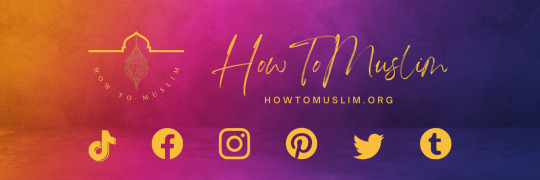
#islamicreminders#quran#islamic#islamdaily#islam#muslim#allah#islamiyet#new article#mosque#originalcharacter
4 notes
·
View notes
Text
ISTIQAMA (Straightforwardness)
People of truth have interpreted straightforwardness as avoiding all deviation and extremes, and as following in the footsteps of the Prophets, the faithful, the witnesses (of truth), and the righteous (in belief) in their religious deeds and daily lives. The verse: Those who declare: "Our Lord is God," and afterwards are straightforward, the angels descend upon them (saying): "Fear not nor grieve, and good tidings to you of Paradise which you were promised" (41:30) informs us that angels will receive in the Hereafter those who acknowledged God's Lordship, affirmed His Unity, and followed the Prophets in their beliefs, deeds, and daily lives. Such a blameless life will cause these people to receive the good tidings of Paradise at a time when all people will tremble with fear and worry on the Day of Judgment.
An individual's conduct becomes straightforward by performing religious duties; one's ego (inner self) becomes straightforward by following the Shari'a's truth; one's spirit becomes straightforward by acting in accordance with knowing God; and one's innermost senses or faculties becomes straightforward by complying with the Shari'a's spirit. The difficulty of being straightforward in all of these levels caused the Prophet, the most straightforward of people, upon him be peace and blessings, to say: Sura Hud and others similar to it have made me old, [1] thereby referring to the Divine command: Be straightforward as you are commanded, which is in sura Hud (11:112).
The Prophet, upon him be peace and blessings, never deviated from the Straight Path, and was always straightforward in his deeds, words, and feelings. He guided Companions who sought salvation and eternal happiness to straightforwardness by saying: Declare: "I have believed in God," and then be straightforward, a saying that concisely sums up all essential elements of belief and conduct.
If people claim progress on the path to the Truth but are not straightforward in their state and conduct, all efforts will be in vain, and they will have to account in the Hereafter for the time spent without straightforwardness. To reach the intended destination, an initiate must be straightforward at the beginning, maintain it throughout the journey, and be straightforward at the end of the path, as gratitude for being rewarded with knowledge of God. Being alert to possible deviation at the beginning, engaging in self-supervision during the journey, being closed to wrong thoughts and actions, and considering only God's pleasure and approval at the end are significant signs of this state:
I know one among the people of straightforwardness:
He was the most distinct in the realm of guidance.
He sold his soul to the lights of (Divine) Identity,
And died purified of all the dirt of human nature.
A servant should seek straightforwardness, not wonderworking or the power of spiritual unveiling or discovery. God demands straightforwardness; however, a servant desires extraordinary spiritual abilities. When they told Bayazid al-Bistami about a man who walked on water and flew in the air, he said:
Fish and frogs also float on water, and insects and birds fly in the air. If you see a man float on his rug on water without sinking and sit cross-legged in the air, do not show any interest in him. Rather, consider whether he is straightforward in his state and conduct, and whether they are in accordance with the Sunna (the way of the Prophet, upon him be peace and blessings).
What Bayazid advises is that a believer be straightforward and completely humble as a servant, not one flying in the atmosphere of wonders.
Straightforwardness is the last step on a three step stairway leading to nearness of God. The first step is consistency, where a traveler strives to embody Islam's theoretical and practical dimensions. Success in this continuous effort brings one's carnal self under control. The second step is settlement or tranquillity, where an initiate purifies his or her inner self of the vices contaminating the spirit and heart (e.g., show, fame, and vanity, all of which cannot be reconciled with servanthood), thereby purging the heart of all that is not God. The third step is straightforwardness, where the doors of Divinity and creation are slightly opened to the traveler, and the Divine gifts are bestowed in the form of wonderworking and blessings, although he or she neither desires nor seeks them.
Straightforwardness, the last station of the way, means living without deviation from loyalty to God and under His direct protection; it is an environment in which Divine gifts and favors are bestowed. Flowers never fade away and hills and slopes do not experience winter, for it is an environment of eternal "spring." This is what is pointed out in: If only they were straightforward on the path, then, assuredly We would give them to drink of "water" in abundance (72:16). So long as people pursue straightforwardness on the path of belief in Divine Unity and fulfill their covenants with God and His Messenger by fulfilling the Divine ordinances, Divine gifts and bounties will flow abundantly.
Our master, upon him be peace and blessings, declares: So long as the heart of a servant is not sound and straight, his belief cannot be true and upright; so long as his tongue is not true, his heart cannot be sound and straight. He also declares: Every morning, the parts of a man's body warn his tongue, saying: "Fear God concerning us. For if you are true, we will be true and straight; if you are crooked, we will also deviate."
Finally, let us hear from As'ad Mukhlis Pasha a very significant warning:
Straightforwardness requires always being true and steadfast;
Fix one of your legs in the center, and let "the free arm of the compass" [your other leg] travel around.
#allah#god#islam#muslim#quran#ayat#revert#convert#help#hijab#religion#reminder#hadith#sunnah#prophet#Muhammad#pray#prayer#salah#muslimah#dua#convert help#revert help#welcome to islam#islam help#muslim help#how to convert to islam#new convert#new muslim#new revert
2 notes
·
View notes
Text
ISLAM 101: Spirituality in Islam: Part 230
Istiqama (Straightforwardness)
People of truth have interpreted straightforwardness as avoiding all deviation and extremes, and as following in the footsteps of the Prophets, the faithful, the witnesses (of truth), and the righteous (in belief) in their religious deeds and daily lives. The verse: Those who declare: “Our Lord is God,” and afterwards are straightforward, the angels descend upon them (saying): “Fear not nor grieve, and good tidings to you of Paradise which you were promised” (41:30) informs us that angels will receive in the Hereafter those who acknowledged God’s Lordship, affirmed His Unity, and followed the Prophets in their beliefs, deeds, and daily lives. Such a blameless life will cause these people to receive the good tidings of Paradise at a time when all people will tremble with fear and worry on the Day of Judgment.
An individual’s conduct becomes straightforward by performing religious duties; one’s ego (inner self) becomes straightforward by following the Shari’a’s truth; one’s spirit becomes straightforward by acting in accordance with knowing God; and one’s innermost senses or faculties becomes straightforward by complying with the Shari’a’s spirit. The difficulty of being straightforward in all of these levels caused the Prophet, the most straightforward of people, upon him be peace and blessings, to say: Sura Hud and others similar to it have made me old, [1] thereby referring to the Divine command: Be straightforward as you are commanded, which is in sura Hud (11:112).
The Prophet, upon him be peace and blessings, never deviated from the Straight Path, and was always straightforward in his deeds, words, and feelings. He guided Companions who sought salvation and eternal happiness to straightforwardness by saying: Declare: “I have believed in God,” and then be straightforward, a saying that concisely sums up all essential elements of belief and conduct.
If people claim progress on the path to the Truth but are not straightforward in their state and conduct, all efforts will be in vain, and they will have to account in the Hereafter for the time spent without straightforwardness. [2] To reach the intended destination, an initiate must be straightforward at the beginning, maintain it throughout the journey, and be straightforward at the end of the path, as gratitude for being rewarded with knowledge of God. Being alert to possible deviation at the beginning, engaging in self-supervision during the journey, being closed to wrong thoughts and actions, and considering only God’s pleasure and approval at the end are significant signs of this state:
I know one among the people of straightforwardness: He was the most distinct in the realm of guidance. He sold his soul to the lights of (Divine) Identity, [3] And died purified of all the dirt of human nature.
A servant should seek straightforwardness, not wonderworking or the power of spiritual unveiling or discovery. God demands straightforwardness; however, a servant desires extraordinary spiritual abilities. When they told Bayazid al-Bistami about a man who walked on water and flew in the air, he said:
Fish and frogs also float on water, and insects and birds fly in the air. If you see a man float on his rug on water without sinking and sit cross-legged in the air, do not show any interest in him. Rather, consider whether he is straightforward in his state and conduct, and whether they are in accordance with the Sunna (the way of the Prophet, upon him be peace and blessings). [4]
What Bayazid advises is that a believer be straightforward and completely humble as a servant, not one flying in the atmosphere of wonders.
Straightforwardness is the last step on a three step stairway leading to nearness of God. The first step is consistency, where a traveler strives to embody Islam’s theoretical and practical dimensions. Success in this continuous effort brings one’s carnal self under control. The second step is settlement or tranquillity, where an initiate purifies his or her inner self of the vices contaminating the spirit and heart (e.g., show, fame, and vanity, all of which cannot be reconciled with servanthood), thereby purging the heart of all that is not God. The third step is straightforwardness, where the doors of Divinity and creation are slightly opened to the traveler, and the Divine gifts are bestowed in the form of wonderworking and blessings, although he or she neither desires nor seeks them.
Straightforwardness, the last station of the way, means living without deviation from loyalty to God and under His direct protection; it is an environment in which Divine gifts and favors are bestowed. Flowers never fade away and hills and slopes do not experience winter, for it is an environment of eternal “spring.” This is what is pointed out in: If only they were straightforward on the path, then, assuredly We would give them to drink of “water” in abundance (72:16). So long as people pursue straightforwardness on the path of belief in Divine Unity and fulfill their covenants with God and His Messenger by fulfilling the Divine ordinances, Divine gifts and bounties will flow abundantly.
Our master, upon him be peace and blessings, declares: So long as the heart of a servant is not sound and straight, his belief cannot be true and upright; so long as his tongue is not true, his heart cannot be sound and straight. [5] He also declares: Every morning, the parts of a man’s body warn his tongue, saying: “Fear God concerning us. For if you are true, we will be true and straight; if you are crooked, we will also deviate.” [6]
Finally, let us hear from As’ad Mukhlis Pasha a very significant warning:
Straightforwardness requires always being true and steadfast;
Fix one of your legs in the center, and let “the free arm of the compass” [your other leg] travel around. [7]
[1] Al-Tirmidhi, “Tafsir al-Qur’an,” 57. [2] Muslim, “Iman,” 62; Ibn Hanbal, Musnad, 3:413. [3] In other words, he submitted himself wholly and without reserve to God. [4] Al-Qushayri, Al-Risala, 397; Ahmad ibn ‘Abd Allah Abu Nu’aym, Hilyat al-Awliya’ wa Tabaqat al-Asfiya’, 10 vols. (Beirut, 1967), 10:40. [5] Ibn Hanbal, Musnad, 3:198. [6] Al-Tirmidhi, “Zuhd,” 61; Ibn Hanbal, Musnad, 3:96. [7] In other words, one is to be well-grounded in Islam and to keep the company of those who can provide proper guidance.
#allah#god#islam#muslim#quran#revert#convert#convert islam#reevrt islam#revert help#reevrt help team#help#islamhelp#converthelp#how to convert to islam#convert to islam#welcome to islam
2 notes
·
View notes